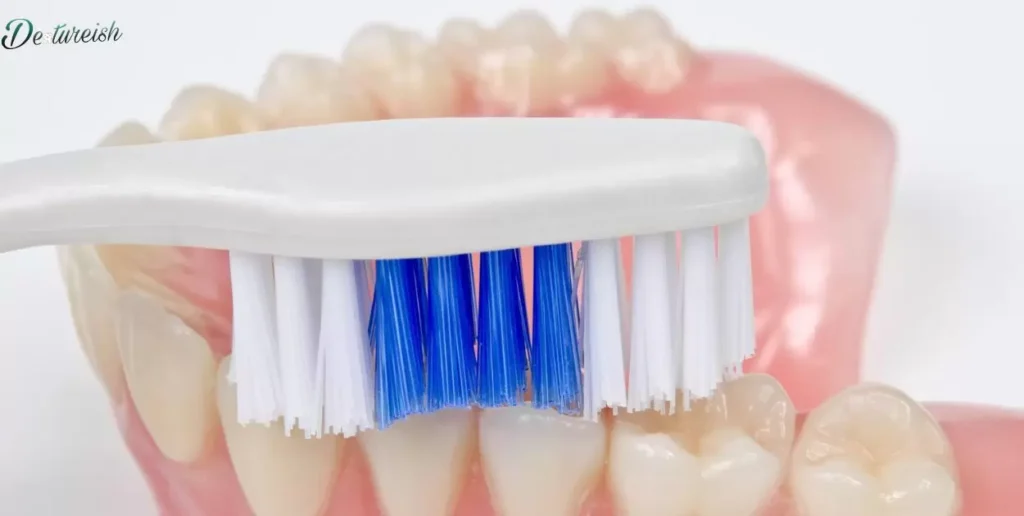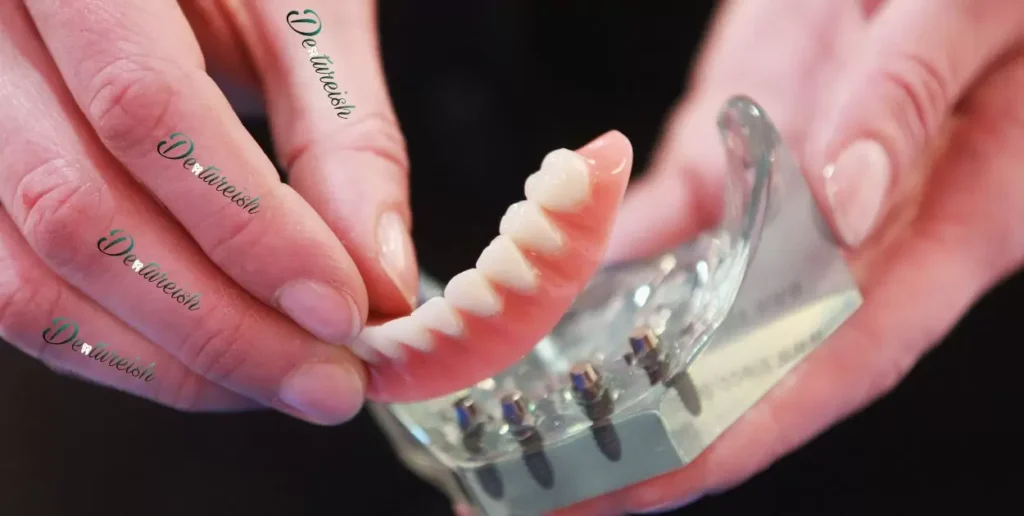Clean Implant Dentures refer to removable dentures supported by dental implants, providing a stable and comfortable solution for individuals with missing teeth. The term emphasizes the importance of maintaining proper hygiene to ensure the longevity and cleanliness of the implant-supported dentures, promoting overall oral health.
Curious about maintaining a sparkling smile with implant dentures? Discover the key to oral hygiene success with our guide on “How Do You Clean Implant Dentures?” Dive into easy steps and essential tips for a confident and radiant smile – take charge of your oral health today!
Cleaning implant dentures is a simple yet crucial routine for oral health. Use a soft brush and mild cleanser to gently clean the dentures, ensuring to reach all surfaces. Regular cleaning helps prevent bacteria buildup and maintains the longevity of your implant-supported dentures.
How To Clean Implants With Waterpik
Cleaning implants with a Waterpik is simple. First, fill the Waterpik reservoir with warm water. Then, use the device to gently and thoroughly clean around the implants, targeting areas where a toothbrush may not reach. Repeat this process regularly to maintain optimal oral hygiene.
Consider adding a non-alcoholic antimicrobial mouthwash to the Waterpik for enhanced cleaning. This proactive approach helps prevent plaque buildup and keeps your implants clean and healthy. Remember, a Waterpik is an effective and convenient tool for maintaining the cleanliness of your dental implants.
Materials Needed for Cleaning Implant Dentures
To clean implant dentures, gather warm water, a soft-bristled toothbrush, and non-abrasive denture cleaner. Mix the cleaner in water as directed on the package, ensuring it’s not too hot. Use the brush to gently scrub the dentures, removing food particles and plaque.
Rinse the dentures thoroughly under running water after brushing to remove any remaining cleaner. Pat them dry with a clean towel before reinserting into your mouth. Regular cleaning keeps implant dentures free from stains and bacteria, ensuring a healthy oral environment.
Step-by-Step Guide to Daily Cleaning Routine
| Step | Description |
| 1. Gather Supplies | Collect soft-bristled toothbrush, denture cleaner, warm water. Ensure cleaner isn’t too abrasive. |
| 2. Mix Cleaner | Follow package directions, dilute cleaner in warm water. Avoid using hot water. |
| 3. Brush Dentures | Gently scrub dentures with the brush to remove food particles and plaque. |
| 4. Rinse Thoroughly | Wash dentures under running water to eliminate any leftover cleaner. |
| 5. Dry Dentures | Pat dry with a clean towel before reinserting into the mouth. |
| 6. Maintain Routine | Regular cleaning ensures dentures stay stain and bacteria-free. |
How To Clean Snap In Dentures
Cleaning snap-in dentures is simple. Begin by removing them from your mouth. Use a soft-bristled toothbrush and mild soap or denture cleaner. Gently brush the dentures, ensuring you clean all surfaces thoroughly. Rinse them well with water before placing them back in your mouth.
For deeper cleaning, consider soaking the snap-in dentures in a denture cleaning solution. Follow the instructions on the product for the appropriate soaking time. Remember to clean your mouth and gums too, ensuring they’re free from any residue before reinserting the dentures. Regular cleaning keeps your snap-in dentures looking and feeling fresh.
Choosing the Right Cleaning Products
When picking denture cleaning products, consider your specific needs. Check for options tailored to your denture type and materials. Look for products recommended by your dentist for effective cleaning.
Different cleaning products offer varied benefits. Some remove stains while others prioritize bacterial elimination. Always follow the instructions for best results. Comparing products helps find the most suitable one for your dentures.
Common Mistakes to Avoid in Denture Cleaning
- Using Regular Toothpaste: Toothpaste meant for natural teeth can be abrasive, damaging dentures over time. Stick to products designed explicitly for denture care.
- Forgetting Daily Cleaning: Neglecting regular cleaning leads to plaque buildup and stains. Clean your dentures daily to maintain their appearance and hygiene.
- Skipping Soaking: Soaking dentures helps remove bacteria and keeps them moist. Skipping this step can lead to dryness and potential warping or cracking.
- Using Hot Water: Hot water can deform dentures, so always use lukewarm or cool water for cleaning to avoid altering their shape.
- Not Seeking Professional Advice: Consulting your dentist for guidance on the right cleaning techniques and products is crucial. Avoiding professional advice might lead to improper care.
Professional Cleaning vs. At-Home Care
Professional cleaning for dentures is done by dental experts using specialized tools. They remove tough stains and bacteria, ensuring thorough hygiene. This process maintains the denture’s quality and extends its lifespan.
At-home care involves regular cleaning by the denture wearer. Using mild cleaners and brushes, they remove daily debris and prevent plaque buildup. This routine upkeep ensures a fresh feel and helps avoid oral health issues.
Frequency of Denture Cleaning: A Guide

Cleaning dentures regularly is crucial. You should clean them daily to prevent plaque buildup. Use a soft-bristled brush and mild soap to scrub gently. Rinse them thoroughly after cleaning.
Soaking dentures overnight is essential too. Use a denture cleaning solution. It helps to remove stains and bacteria. Follow these steps to maintain clean and hygienic dentures for a confident smile.
Tips for Cleaning Implant Dentures with Attachments
| Tip | Description |
| Brushing Twice Daily | Use a soft-bristled brush and circular motions to clean implant dentures thoroughly. |
| Interdental Brushes for Attachments | Utilize interdental brushes to clean around and between the attachments, removing debris. |
| Non-Abrasive Cleansers | Use non-abrasive cleansers recommended by your dentist to avoid damaging the implant dentures. |
| Regular Professional Check-ups | Schedule routine check-ups to ensure proper cleaning techniques and the health of your dentures. |
| Soaking in Denture Cleansing Solution | Soak dentures with attachments in a cleansing solution as directed by your dental professional. |
How To Remove Implant Dentures
To remove implant dentures, first, rinse your mouth with water to loosen any debris. Use a clean finger to gently press on the denture’s edges, slowly easing it out of place. Wiggle it back and forth until it comes out comfortably.
Another method is to use a denture adhesive remover. Apply a small amount around the edges of the denture and wait a few minutes for it to work. Then, gently twist and lift the denture to remove it without discomfort. Remember to clean both your mouth and the dentures after removal for proper maintenance.
Dealing with Stains and Discoloration
When you see stains on dentures, brush them gently with a soft toothbrush and mild soap. Avoid using harsh chemicals to prevent damage to the dentures. Soaking them in a mixture of water and baking soda can also help remove stains effectively.
“For discoloration, consider using a denture cleaner or soaking Dentures Step By Step in a vinegar solution. Rinse this thoroughly after cleaning to remove any residue. Regular care and cleaning can keep your dentures looking clean and bright.”
Importance of Regular Check-ups for Implant Dentures
Regular check-ups for implant dentures are crucial for maintaining oral health. These check-ups help ensure that the dentures fit properly and function well. Dentists can detect any issues early on and prevent potential complications, allowing for timely adjustments or treatments.
During these check-ups, dentists examine the implants, gums, and overall oral condition. They clean the dentures professionally, removing plaque or debris that may cause problems. These routine visits also provide an opportunity for patients to discuss any concerns they may have about their implant dentures, ensuring continued comfort and functionality in their daily lives.
Cleaning Implant Dentures for Optimal Oral Health
Keeping your implant dentures clean is crucial for a healthy mouth. Brush your dentures daily using a soft-bristled toothbrush and non-abrasive toothpaste. Rinse them thoroughly after meals to remove food particles and prevent plaque buildup.
Soak your dentures in a denture cleaner or a mixture of vinegar and water for a deep clean. Regular cleaning ensures a comfortable fit and prevents oral infections. Remember, a clean set of implant dentures contributes to your overall oral health and confidence in your smile.
Dental Implant Cleaning Cost
Cleaning dental implants typically costs between $100 to $300. Dentists use special tools to remove plaque and tartar without damaging the implants. Regular cleaning helps prevent infections and maintains the implants’ durability.
The cost for cleaning dental implants may vary based on location and the complexity of the procedure. Patients should inquire with their dentist about specific pricing and whether insurance covers any part of the cleaning expenses. Keeping implants clean is crucial for their longevity and overall oral health.
Ensuring Hygiene in Denture Storage
Storing dentures safely keeps them clean. Use a denture cleaner recommended by your dentist. Store dentures in a clean container with water. Regularly change the water to prevent bacteria growth. Keeping dentures clean ensures oral hygiene.
Avoid leaving dentures dry, as it can warp them. Always handle dentures with care to avoid damage. Consult your dentist for specific storage instructions. Maintaining proper hygiene in denture storage promotes oral health and longevity.
Troubleshooting: Addressing Cleaning Challenges
When cleaning dentures, tackle challenges head-on. Use a soft-bristled brush to remove debris gently. Soak the dentures in a cleaning solution to eliminate stains and bacteria.
If facing persistent stains, try soaking overnight for better results. Rinse thoroughly before reinserting into your mouth. Regular cleaning prevents future issues and maintains oral health.
Incorporating Cleaning into Overall Oral Care Routine
Keeping dentures clean is crucial for good oral hygiene. You should clean dentures daily to prevent plaque buildup. Brush them gently with a denture brush and non-abrasive cleaner.
In addition to daily cleaning, soak dentures in a solution overnight. This helps remove stains and bacteria, keeping them fresh. Regular cleaning as part of your oral care routine maintains denture hygiene and oral health.
How To Remove Snap On Dentures
Removing snap-on dentures is simple. First, rinse your mouth with warm water to loosen them. Then, gently rock the dentures back and forth to release them from the snaps. Once loose, carefully lift them out by gripping the base, avoiding any force that may damage your gums. Finally, clean both your dentures and gums thoroughly before reattaching the snaps.

Another method involves using a denture adhesive remover. Apply a small amount around the snap attachments and wait for a few minutes to weaken the bond. Then, follow the same gentle rocking motion to detach the dentures without causing discomfort.
Hygienic Practices for Implant Denture Wearers
Implant denture wearers must prioritize hygiene. Brushing teeth after meals is crucial. Use a soft-bristled toothbrush and non-abrasive toothpaste. Regularly clean around the implants and gums using floss. Mouthwash can further reduce bacteria. Annual dental check-ups are essential for thorough cleaning and assessment.
Avoiding harmful habits is vital. Don’t smoke, as it can harm implants. Avoid hard foods that might damage dentures. Proper care maintains implant longevity. Follow these practices for a healthy, lasting smile.
Educating Yourself on Denture Materials and Cleaning
When learning about denture materials, explore options like acrylic, porcelain, or metal. Each type has its benefits, so understand their differences for a better choice. Knowing the material helps in picking durable, comfortable dentures.
Cleaning dentures involves daily routines like brushing with a soft-bristled brush and using mild soap. Avoid abrasive cleaners that can damage the material. Regular cleaning maintains hygiene and extends the life of your dentures.
Snap-In Denture Removal Tool
The Snap-In Denture Removal Tool makes taking out dentures simple. It’s a handy device designed to help you easily remove snap-in dentures without hassle. Its ergonomic design ensures a comfortable grip, making the removal process effortless. Just slide the tool beneath the denture, gently apply pressure, and the denture pops out smoothly.
This tool is a game-changer for denture wearers. With its user-friendly approach, it eliminates the struggle of removing snap-in dentures. Its efficiency and ease of use make it a must-have for anyone with snap-in dentures, providing a quick and painless way to take them out.
Impact of Diet on Implant Denture Cleaning
Your diet affects how easily you can clean your implant dentures. Certain foods might leave more residue, making cleaning tougher. A healthy diet can reduce buildup and make cleaning your dentures easier.
Foods high in sugars or sticky substances can leave residues on your implant dentures. These residues can be harder to clean, leading to potential issues with oral hygiene. Opting for a balanced diet with fewer sugary and sticky foods can help maintain cleaner dentures, simplifying your cleaning routine.
Frequently Asked Question
What is the best cleaner for implant dentures?
A non-abrasive, non-toxic denture cleaner recommended by your dentist is best for implant dentures’ upkeep. Avoid harsh chemicals and abrasive materials to preserve the integrity of your dentures.
How are dental implants cleaned?
Dental implants are cleaned like natural teeth, using a toothbrush and floss. Special attention to thorough cleaning around the implant is essential for long-term care.
What is the best way to clean implants?
The best way to clean implants is by using a soft-bristled toothbrush and non-abrasive toothpaste. Regularly brushing and flossing around the implant area helps maintain oral hygiene.
What is the best cleaning for implants?
The best cleaning for implants involves regular brushing with a soft-bristled toothbrush and non-abrasive toothpaste, accompanied by using interdental brushes or floss to clean hard-to-reach areas.
Conclusion
Proper cleaning of implant dentures is paramount to maintaining oral health. Regular brushing with a soft-bristled brush and non-abrasive toothpaste is essential to remove plaque and food particles. Additionally, using an antimicrobial mouth rinse can help in reducing bacterial buildup around the implants.
Ensuring the longevity of implant dentures involves meticulous care. Employing techniques such as using interdental brushes and floss threaders can aid in reaching difficult-to-access areas, promoting thorough cleaning and preventing potential complications. Overall, a consistent and gentle cleaning routine is crucial for preserving the integrity of implant dentures and supporting oral hygiene.

